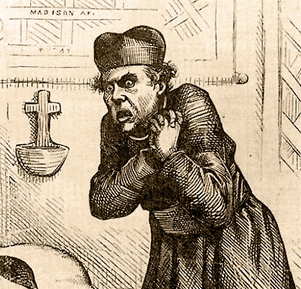 As there has been a lot of talk about Erich Przywara recently (due to an English translation of Analogia Entis), I was reminded of the following passages of Josef Pieper’s autobiography. Pieper wrote three volumes of autobiography–all fascinating stuff; it’s a pity only the first vol. has been translated into English.
As there has been a lot of talk about Erich Przywara recently (due to an English translation of Analogia Entis), I was reminded of the following passages of Josef Pieper’s autobiography. Pieper wrote three volumes of autobiography–all fascinating stuff; it’s a pity only the first vol. has been translated into English.
*********
My journey to Basle had a very special significance. I had come into contact with a small, budding association of young people First of all I found their behavior rather mysterious. For instance the new candidate was observed from time to time, more or less without his knowledge, and evidently was being thoroughly evaluated. But there was no secrecy whatsoever about the unusual nature of membership of the society, nor about its advantages. Initially one did not have to pay anything; later, of course, when one was in appropriate financial circumstances, all the resources of which a member had made use were to be repaid, according to the very sensible maxim, which I have later found to be true a hundred times, that what is given for nothing is worth nothing, —So, for years, I actually paid more than a tenth of my not inconsiderable assistant’s salary, every month, to this group of people, without a moment’s regret. What I had gained was far more wonderful than the money; money could not have bought it. Basically it was an attempt to vie with the university, since it was clear that the latter could not be expected to provide a really human education, nor even a philosophical and theological foundation for the knowledge pursued by the various disciplines. So we bound ourselves for two years to participate in a kind of studium generale during the long semester vacations.
[…] The word “vacation course” hardly gives any idea of the enormous intensity of work, compared with the average university course, which was expected of us as if it were the most natural thing in the world. Every morning we had two hours of lectures, every afternoon a seminar, and every evening a colloquium. But again, what was most unusual was the teacher, the inner style of his thought and also his manner of teaching. In Germany at that time there must hardly have been anyone as thoroughly at home in the great tradition of philosophy and theology (and not only the European tradition) as Erich Przywara, who at the same time, on the basis of no less immediate a grasp of the problems, participated so energetically in the most contemporary controversies—on phenomenology, on Sigmund Freud, on dialectical theology. It was the public disputation between him and Karl Barth, which took place in the University of Münster more than a decade before the Second World War, that started the “dialogue” between the Christian denominations which has since been the subject of so much discussion.
[…] I myself once played a somewhat macabre practical joke on Erich Przywara—and to this day I do not know whether he forgot all about it or not. At the time he must have been shocked by it, for our class spokesman, who used to accompany him, told me the following day that the best thing would be not to utter another word about the whole business, not even so much as to apologize. What happened was this: late one night Przywara, who was an extremely sensitive and vulnerable man, came back from a visit in the neighborhood and entered his room, not suspecting anything, to be confronted with the sight of himself, lying dead in his own soutane, raised on a bier improvised out of his couch and some trestles, with a candle burning at his side and his breviary on his breast open at the prayers for the dead. All this was illuminated by the pale, gray light from the ceiling bulb which I had covered with an inverted open umbrella.
Przywara’s lectures were almost exactly the opposite of “scholastic” philosophy, in spite of the almost pedantically precise “dispositions” we found on the table every morning. One of the jobs we had to do in rotation was to reproduce copies of these on a primitive apparatus. As a result of this guided study, which linked the historical with the systematic in a brilliant way, I saw for the first time that every attempt to produce an absolutely tight system runs counter to the real-life situation of the finite spirit, of man’s creaturehood. It is a pity that Przywara could not see his way to publish these philosophical-theological lectures in their breadth of perspective, in spite of their being perhaps somewhat vulnerable in their initial formulation. The unfinished, and hardly readable book, Analogia Entis (1932), which he himself declares is the quintessence of his view, in fact gives no idea of the wealth of concrete material he spread out before us in those days.

Leave a comment